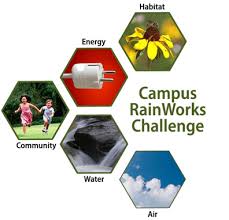 The U.S. Environmental Protection Agency (EPA) has opened registration for student teams from colleges and universities across the country to participate in its new design competition, the Campus RainWorks Challenge, through which teams will compete to develop innovative approaches to stormwater management. This first annual competition, will help raise awareness of green design and planning approaches at colleges and universities, and train the next generation of landscape architects, planners, and engineers in green infrastructure principles and design. Stormwater is a major cause of harmful water pollution in urban areas in the U.S., impacting tens of thousands of miles of rivers, streams, and coastal shorelines, as well as hundreds of thousands of acres of lakes, reservoirs, and ponds.
The U.S. Environmental Protection Agency (EPA) has opened registration for student teams from colleges and universities across the country to participate in its new design competition, the Campus RainWorks Challenge, through which teams will compete to develop innovative approaches to stormwater management. This first annual competition, will help raise awareness of green design and planning approaches at colleges and universities, and train the next generation of landscape architects, planners, and engineers in green infrastructure principles and design. Stormwater is a major cause of harmful water pollution in urban areas in the U.S., impacting tens of thousands of miles of rivers, streams, and coastal shorelines, as well as hundreds of thousands of acres of lakes, reservoirs, and ponds.
Student teams, working with a faculty advisor, will submit design plans for a proposed green infrastructure project for their campus. Registration for the Campus RainWorks Challenge is open from September 4 through October 5, and entries must be submitted by December 14, 2012 for consideration. Winning entries will be selected by EPA and announced in April 2013. Winning teams will earn a cash prize of $1,500 – $2,500, as well as $8,000 – $11,000 in funds for their faculty advisor to conduct research on green infrastructure. In 2013, EPA plans to expand Campus RainWorks by inviting students to design and complete a demonstration project assessing innovative green infrastructure approaches on their campus.
EPA is encouraging the use of green infrastructure as a solution to help manage stormwater runoff. Green Infrastructure uses vegetation, soils, and natural processes to manage stormwater runoff at its source and provide other community benefits. Green infrastructure is increasingly being used to supplement or substitute for single-purpose ³gray² infrastructure investments such as pipes, and ponds. The Campus RainWorks Challenge will help encourage the use of green infrastructure projects on college and university campuses to manage stormwater discharges.
More information on the Campus RainWorks Challenge.

Find Us On Social Media!